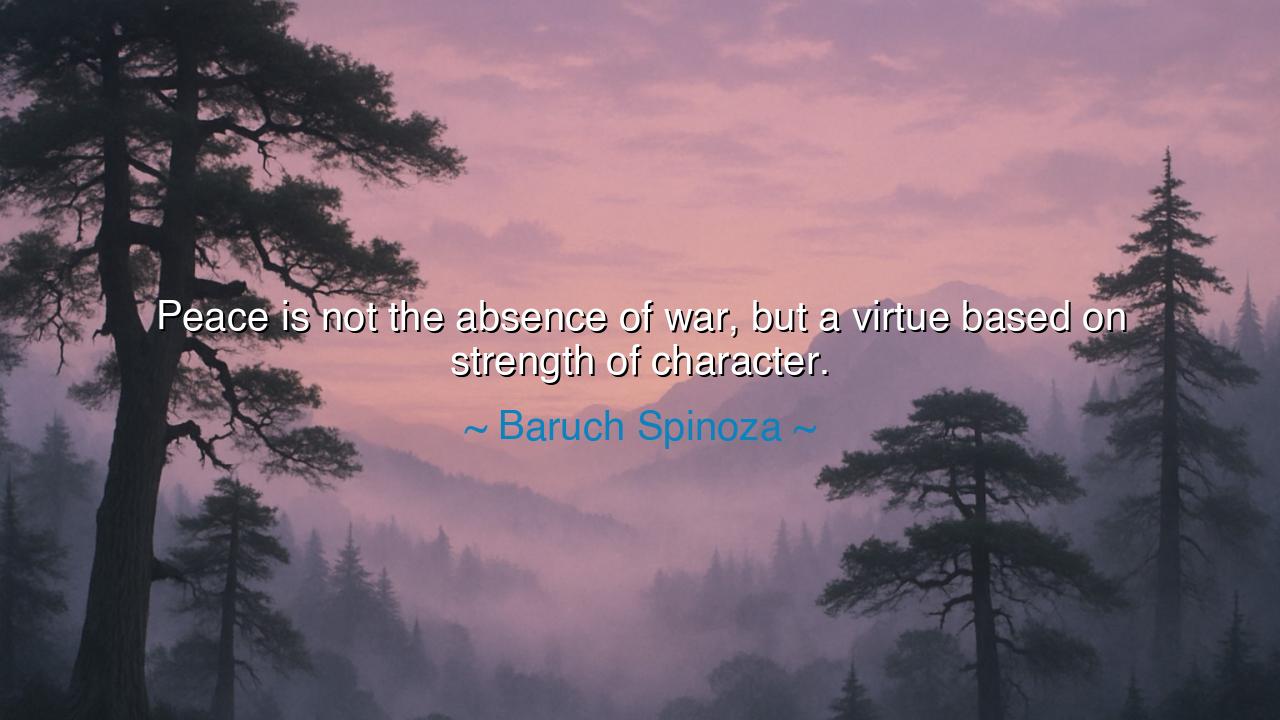
Peace is not the absence of war, but a virtue based on strength






The words of Baruch Spinoza — “Peace is not the absence of war, but a virtue based on strength of character.” — shine like a lamp across the centuries, illuminating a truth often forgotten by nations and by individuals alike. To many, peace is thought of as emptiness, a lull, a void where cannons do not roar and swords are not drawn. But Spinoza, philosopher of reason and the human heart, reminds us that true peace is not a silence born of exhaustion, but a flame born of inner strength. It is not the pause between battles, but a condition of the soul, rooted in character.
To define peace only as the absence of war is to reduce it to chance, a fragile stillness that can be broken by the next ambition or grievance. Such peace is brittle, easily shattered like thin glass. But to see peace as virtue is to see it as something built, cultivated, and guarded not by chance, but by deliberate effort. Just as a garden thrives not because weeds are absent, but because the gardener tends it with care, so peace endures not because conflict has disappeared, but because people have chosen to live with justice, compassion, and dignity.
History gives us luminous testimony. After the long and bloody years of the American Civil War, the nation did not instantly find peace. The guns had fallen silent, but hatred, division, and oppression remained. The absence of war was not yet the presence of peace. It took generations of labor, of struggle for civil rights, of individuals showing extraordinary strength of character — men and women who would not bend in the pursuit of justice — for true peace to even begin to blossom. Here, we see Spinoza’s wisdom: without virtue, silence is merely a pause, not a resolution.
Consider also the life of Nelson Mandela. For decades, South Africa was wracked by the brutality of apartheid, a war of injustice that scarred the land and its people. When Mandela was released from prison, he could have sought revenge, and the land could have descended into fire. Yet, through his unyielding strength of character, he chose reconciliation, forgiveness, and unity. He showed the world that peace is not a passive state but an active virtue — a discipline of the heart that demands courage even greater than the courage of battle.
Spinoza’s words also remind us that the battlefield is not always among nations; often it is within the self. Many mistake the absence of outward conflict in their lives for peace, yet their hearts rage with envy, bitterness, or fear. But true peace comes when the soul is governed by character — when it has learned discipline, when it has mastered anger, when it has chosen forgiveness. The man or woman who has cultivated such peace carries it wherever they go, unshaken by storms, undisturbed by noise.
The lesson is clear: peace is not given, it is earned. It is not the weakness of surrender, but the strength of discipline. It is not found in waiting for strife to pass, but in shaping ourselves into people who can live justly, kindly, and bravely even amid the shadows of conflict. Without the foundation of virtue, no peace can endure; with it, peace can exist even in the hardest of times.
Practical wisdom follows. In your own life, do not wait for conflict to vanish before seeking peace. Instead, build it within yourself. Practice honesty, cultivate patience, strengthen your resolve to forgive rather than retaliate. In your community, be one who listens before striking, who heals rather than divides. And in the greater world, remember that the absence of war is only the beginning; the presence of justice and character is the true measure of peace.
Thus, Spinoza’s words remain a guiding star: peace is not a hollow silence, but a living virtue born of strength. It is the fruit of character, the labor of the soul, the courage of men and women who choose justice over vengeance, compassion over cruelty, and discipline over chaos. Let each generation remember: it is not enough to end the wars of weapons; we must also win the wars of the heart. Only then shall peace endure.






AAdministratorAdministrator
Welcome, honored guests. Please leave a comment, we will respond soon